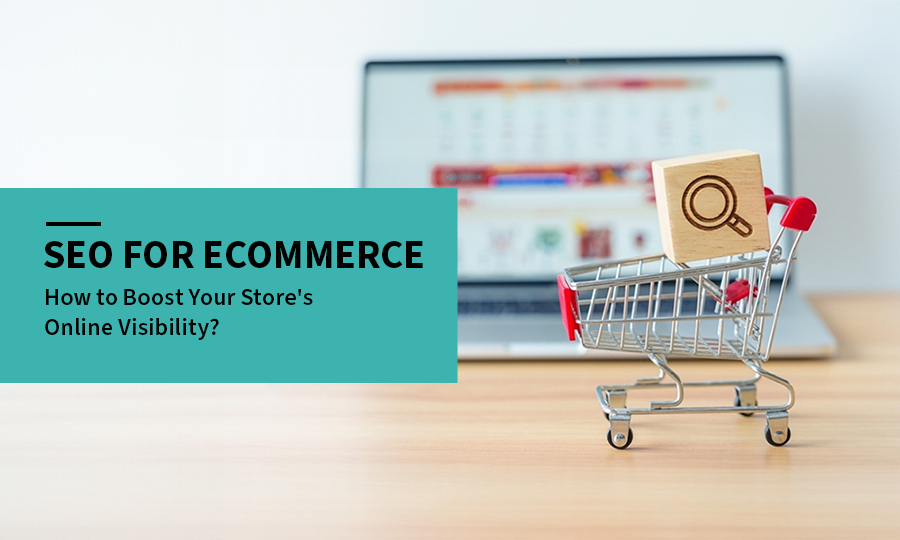SEO for eCommerce can prove to be a game-changer for online retail businesses. It is a massive traffic generation strategy that can skyrocket sales by gigantic margins! In fact, 53% of web traffic is organic in nature.
The scenario for online shopping is changing. Just a decade back, people were skeptical about purchasing products online. However, recent statistics show a changed scenario. According to it, 28% of the global population uses eCommerce websites on a regular basis. And if you enter the competition, it is going to be a rocky road ahead unless you harness the power of eCommerce SEO.
People shop every day. Most people in the urban region depend on quick online deliveries to meet their everyday requirements!
Hence, no matter what you are trying to sell online, there are loads of potential customers. You just need to boost up the search engine rankings for better online visibility.
How to do SEO for eCommerce websites?
We are here with a blog that offers the ultimate guide on eCommerce SEO! Read till the end to discover all there is to know about boosting online visibility on the search engines for online retail stores.
What is SEO for Ecommerce?
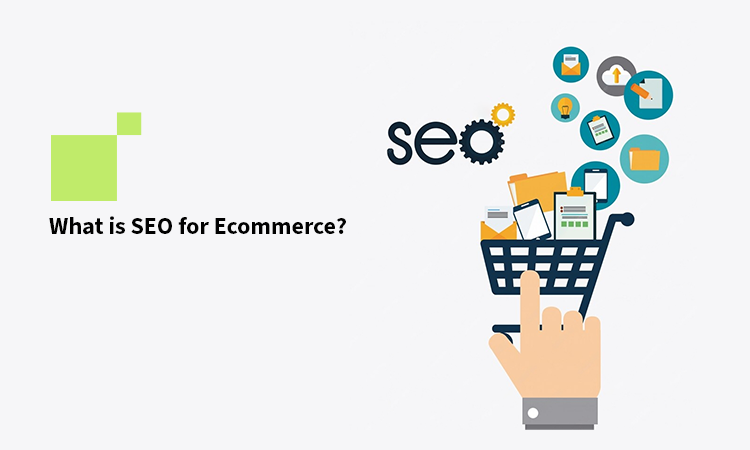
Ecommerce SEO proves beneficial in helping businesses reach their target audience without solely relying on paid advertising. Good SEO optimization helps drive more organic traffic to your site’s web pages. SEO for eCommerce not only boost your online presence but also has a direct impact on sales.
It also involves optimizing various website elements, like product and category pages, addressing website architecture issues, and building high-quality backlinks.
Successfully implementing ecommerce SEO requires targeting both commercial and informational keywords. Commercial keywords focus on potential buyers, while informational keywords target users seeking information.
SEO for ecommerce is much more than this, it involves a working knowledge of how search engines work and on what basis they reward websites. It also includes analyzing the buyer’s intent, following Google’s guidelines, and implementing the strategies tactfully.
Why Ecommerce SEO Matters?
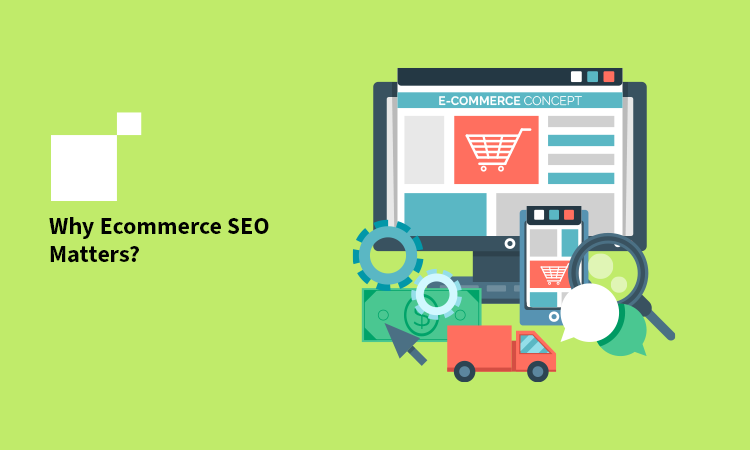
Ecommerce SEO proves beneficial in helping businesses reach their target audience without solely relying on paid advertising. By optimizing your website for search engines like Google, you can increase the online visibility in search engine results pages and drive organic traffic to the product and category pages.
- eCommerce SEO secures better rankings on the SERPs
- Effective eCommerce SEO has a positive impact on the sales figures
- It can be persuasive enough to convert organic traffic into paying customers
- eCommerce SEO enhances positive user behavior, which garners trustability from the search engines.
The Best Ecommerce SEO Guide: Your Extensive Roadmap to Success
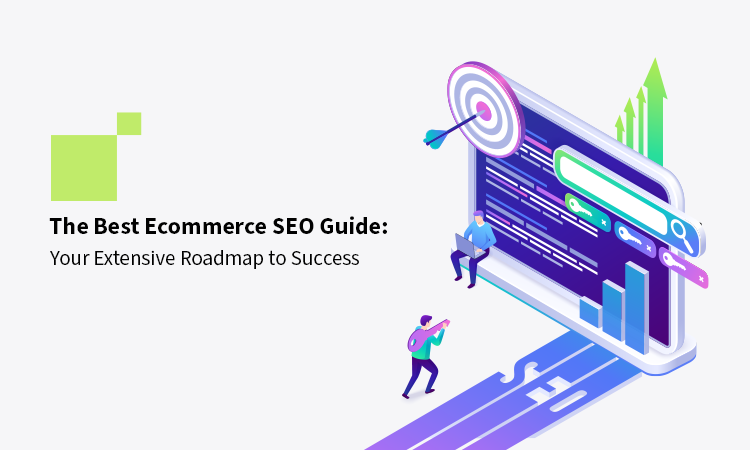
People globally prefer online ordering over buying things off the counter. Statistics say, 28% of the global population are online buyers.
Hence, it becomes essential for businesses to analyze the data and have a proper understanding of customer’s preferences. However, that is not enough. You can appease the customer with the product, but to establish a thriving online retail business, you have to earn the trust of the search engines!
This is why ecommerce SEO is a must! It is one of the best ways of beating the online and offline market competition and getting on the top.
Wondering how the rankings of your ecommerce website increase in SERPs? Though SEO for ecommerce websites seems to be challenging, you can always make a positive start by implementing some of the best search engine optimization practices in your ecommerce website.
Ready? Let’s dive into a well-structured SEO strategy that will act as a roadmap to bringing success to the online business.
1. Ecommerce Keyword Research

Keyword research is the backbone of any successful ecommerce SEO campaign. You can optimize your website’s content and structure to attract potential customers by identifying high-converting and easily rankable keywords for the product and category pages.
You need to understand keyword difficulty and their influence on the ecommerce SEO strategy. This is vital for those who want to fully leverage the power of target keyword research.
In addition, you can streamline the research process by utilizing the best ecommerce SEO tools. This will help you uncover the most specific keywords for your online store.
i. Types of Keywords: Commercial vs. Informational
In ecommerce SEO, there are mainly two types of keywords: commercial and informational. Commercial keywords target potential buyers, while informational keywords cater to users seeking information. Both these keyword types play an essential role in your overall SEO strategy.
Commercial keywords are extensively crucial for targeting potential buyers who intend to make a purchase. So, you can attract these users with high purchase intent by optimizing the product and category pages with product-focused keywords. Using target keywords in your product pages also increases the chances of making a sale.
Contrary to this, informational keywords target users who are looking for helpful content and might not be ready enough to make a purchase at this very moment. Still, they can contribute to your website’s organic traffic.
Creating high-quality content around informational keyword ideas can help you rank for a wide range of search intent. This will ultimately drive more traffic to your ecommerce website.
Try targeting both commercial and informational keywords. It can help in boosting the rank on the search engines and attract a diverse base of customers.
ii. Effective Keyword Research Tool
Conducting keyword research is absolutely essential for a booming online store. You can take the help of several keyword research tools for this purpose.
Free keyword research tools like Google Keyword Planner can help find high-value keywords that resonate with the search query with the target audience. If you are looking for a superb paid tool for keyword research, ‘SEMrush’ can be your best bet.
Try finding keywords that are relevant to the listed products, have a high search volume, and a relatively lower competition.
These tools can help you in a variety of ways. They are;
- Analyze your competitors’ keyword strategies
- Uncover long-tail keywords
- Identify keyword gaps in your own strategy
- Discover keywords with high search volume
2. Site Structure & Navigation Optimization
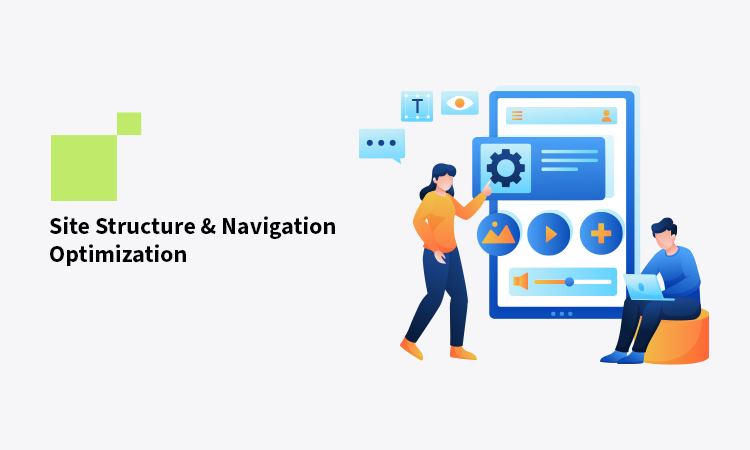
A proper website structure that categorizes products into broader categories and then into subcategories is essential for the smooth functioning of an eCommerce website.
A hierarchical website makes it easier for visitors to find relevant products. It translates to a better user experience. This ensures that your site’s navigation is intuitive and makes it effective for other search engines to crawl and index the pages.
Let’s check out how creating an organized hierarchy and optimizing URLs and breadcrumbs can enhance your ecommerce site’s search engine indexing and user experience.
i. Creating an Organized Hierarchy
To attain a seamless user experience, a well-organized hierarchy is vital!
It allows the users to easily access the product they are looking for with just a few clicks. If your eCommerce website is hierarchically structured, it helps guide users effortlessly while navigating the product categories.
An organized hierarchy also benefits the SEO rankings, allowing search engine bots to crawl and index the pages more efficiently. It also ensures that the website content is easily accessible to search engines and users to boost your site’s authority and improve its search performance.
ii. Optimizing URLs and Breadcrumbs
Another important element that plays a crucial role in SEO for eCommerce websites is URLs and breadcrumbs. This helps in optimizing your website’s user experience and search engine indexing.
It is best to write a simple URL that is easy for the search engines to understand. The simplest and the best kind of URL for an ecommerce website is;
Protocol>>Su- Domain>>Domain>>Slug>> Article permalink
Try avoiding any non-ASCII characters in the URL, as it is hard for the search engines to read. As a result, the ranking on the search results may drop.
Another crucial aspect of a good website ranking is breadcrumbs. This is nothing but the trail that users can track to and fro following their navigational path on any particular website. It helps in seamless user navigation that translates to better user experience.
It is better to incorporate keywords in the URL in order to avoid issues like duplicate content or any other unnecessary parameters.
3. On-Page SEO Techniques for Ecommerce
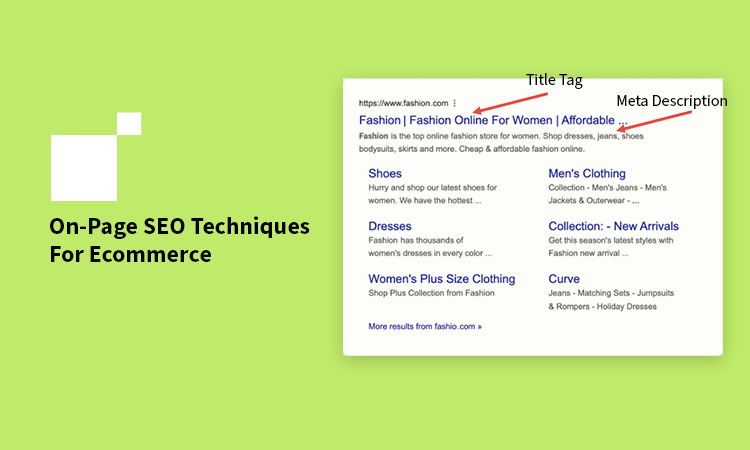
If you aspire to a high rank for your e-commerce website, you only have one option other than packing the best possible punch with on-page SEO tactics.
As the content for any website is the no.1 ranking factor, it is better to get going with the best on-page SEO techniques for eCommerce websites.
The on-page elements of any website consist of. Title tags, meta descriptions, product descriptions, blogs, image optimization, image alt tags, etc. Optimizing these will give the eCommerce website a boost in the search rankings.
Let’s walk you through the on-page SEO factors one by one to give you a comprehensive idea about these factors;
i. Title Tag and Meta Description
Title tags and meta descriptions are two of the most essential components of any category page. While the former says that the product is accurate, the latter offers a brief description of the whole category page to the visitor before they click on it.
A crisp meta description is extremely crucial because those 120 to 155 characters help a potential buyer decide whether or not they want to click on a particular link. An accurate title and meta description also assist search engines in understanding the context of your website by providing a brief overview of individual web pages.
Ensure that the title and the meta description are keyword-rich. These keywords are cues for the web crawlers and the surfers to understand what a webpage is about. This tactic improves the website’s organic search engine rankings and attracts users to click through your site.
Also, it is important to adhere to the character limit. The ideal limit for a title is within 60 characters (including spaces), and the meta description should be under 155 characters. Also, it’s better to infuse modifiers like “Hourly Deals” or “Free Shipping” into the meta description to improve your web page click-through rates.
ii. Category Page OPtimization
Another best ecommerce strategy that helps a lot in attracting potential customers is optimizing your product page content.
You can optimize the product pages by crafting unique descriptions and incorporating some relevant keywords and high-quality images. This will enhance your product pages’ visibility and appeal to users.
Additionally, you can also choose to optimize the ecommerce site’s category page to improve the overall user experience and search engine performance.
Follow these tips while optimizing your product page content:
- Use keyword research tools to find sets of relevant keywords for each category
- Use keywords in the product descriptions, meta descriptions, titles, and alt tags
- Refrain from overstuffing keywords. Always resort to ethical eCommerce SEO practices.
- Ensure that the website content is informative and engaging.
- Write accurate product descriptions to help potential buyers make final decisions about the product.
4. Technical SEO Considerations

Of course, a good level of SEO optimization requires impeccable on-page and off-page SEO, but without proper technical optimization, you can kiss the conversion rate a sweet goodbye!
Technical SEO of a website has a plethora of elements on the micro level that make up the website experience. Optimizing it can be a hassle and time-consuming, to say the least! Hence, you can get the assistance of a professional SEO company for this task.
Technical SEO is the invisible component that makes up for a seamless user experience. We are going to discuss several components of technical eCommerce SEO in brief.
Let’s walk you through them:
i. Mobile-Friendliness
Create a website that is mobile-friendly. Google, the search engine giant that dominates 90% of its shares, has a policy of mobile-first indexing. This means that websites that are mobile-optimized get indexed before websites that are optimized for only desktops.
Besides, about 63% of web surfers browse retail sites from their mobile devices. Under these circumstances, not optimizing your website would not be wise.
You can start with a couple of simple things, such as mobile optimization measures to boost the SEO for eCommerce websites;
- Implement a responsive design
- Write website content in shorter paragraphs
- Reduce the loading time
- Resize the images on web pages for mobile viewing
- Simplify website navigation for better user experience
Through mobile optimization, you can easily cater to the growing number of mobile users, resulting in improved user experience, increased visibility, and sales.
ii. Site Speed and Performance on Search Engines
The website speed impacts the user experience immensely. It also affects the search engine rankings. As an eCommerce website, aim for a loading speed of under 3 seconds. Anything more than that will cause the website to lose traffic, which will go straight to your competitor!
With a high bounce rate, you lose the trustability factor in the eyes of the search engine, causing the website ranking to take a dip.
Don’t want a slack in website speed? Here are some tips;
- Reduce page load times by compressing images
- Minify code
- Utilize a content delivery network (CDN)
- Consider removing any unnecessary elements or plugins that may be slowing down the website.
Taking these simple measures will not only work in favor of your ranking on the SERP but also provide a better user experience.
5. Content Marketing Strategies for Ecommerce Site
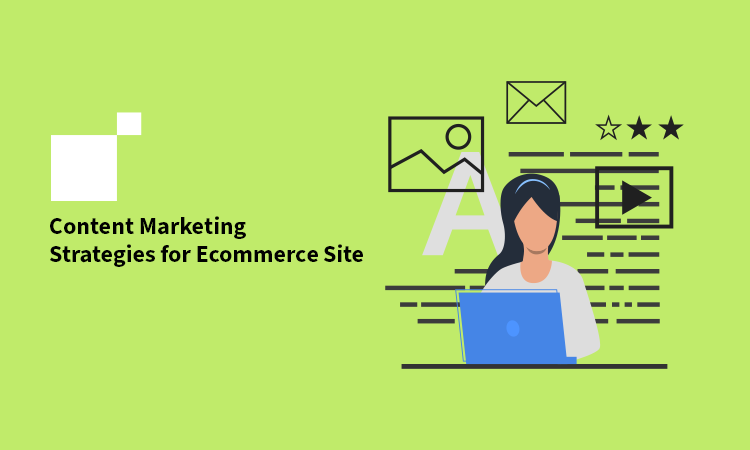
Content marketing plays a dominant role in conducting SEO for ecommerce sites. The content of your website determines how it approaches the target audience.
The ideal content for eCommerce websites should be precise and to the point, as well as have a hint of personal touch to it.
You are not a content writer; neither is your website designer. If you want an e-commerce website to thrive, it is perhaps better to get the content written by a team of professionals who know what they are doing.
Writing eCommerce website content must include leveraging long-tail keywords to identify the exact search queries. These keywords help direct its users to relevant products, categories, and resources. Of course, the incorporation of other keywords is important too! Try crafting informative blogs to pose yourself as an authoritative source.
i. Leveraging Long-Tail Keywords
Ensure to identify long-tail keywords for your ecommerce website while performing SEO for ecommerce. You can identify using keyword research tools and analyze your competitors’ content strategies.
These long-tail keywords can drive targeted traffic to the website. Incorporating long-tail keywords along with the primary keyword in the blog content helps attract users who are looking for specific information.
ii. Building Internal Links
Placing internal links is one of the established and important aspects of content marketing. This refers to the process where there are several links anchored on an article/ web blog of your website that links to another webpage of your own site.
There are two main benefits of internal links;
- Users can find more valuable information within the content. It boosts the on-page time.
- It helps in indexing pages as web crawlers can scan through various web pages in one go.
Follow these tips for building effective internal links:
- Identify relevant and important pages on the website that can be linked to from the homepage.
- While creating internal links, ensure to use descriptive anchor text.
- Include internal links naturally within your content, ensuring that it provides value to your readers.
Internal linking your blog posts with product pages strategically can improve your website’s ranking in search results pages. It provides the users with a more enjoyable experience.
6. Link Building Tactics for Online Store

Another significant ranking factor that matters in ecommerce SEO is link building. This helps search engines determine your website’s credibility and authority.
Sounds excellent? But how can you build these backlinks?
When it comes to building a high-quality backlink portfolio, there is just one rule: DON’T HASTE!
Coming to the tactics, you can boost the domain authority through several off-page SEO tactics, such as guest posting and social media marketing, press releases, creative, collaborative campaigns, and issuing white papers.
Let’s highlight two of the most legitimate ways of earning valuable backlinks, thereby boosting your ecommerce website’s search performance.
i. Guest Posting
Guest posting is perhaps one of the most popular link-building strategies that eCommerce websites use to boost their online visibility.
There are three distinct phases of guest posting for e-commerce websites:
- Approach the concerned webmaster with an offer
- On acceptance, craft a guest post that links back to your website
- Choose the right anchor text and monitor its placement on the host’s domain
This particular SEO tactic helps increase the website’s authority by earning valuable backlinks from other reputed websites, thus boosting your search engine rankings.
ii. Creative Campaigns and Partnerships
This is, instead, an innovative approach towards link building in a natural manner. You can collaborate with businesses like yours to generate links on each other’s websites.
For instance, if you sell home decor online, you can contact other webmasters who have similar domains to promote each other. This type of partnership can generate high-quality links to deck up your backlink portfolio.
If you are still unsure of partnering with a similar business type, you can always collaborate with complementary businesses. You can carry this type of joint marketing activities on social media for the best results.
iii. Online Rating & Reviews
Online reviews and ratings are factored in by Google’s complex core algorithm. Positive reviews signal to the search engine about the credibility and trustworthiness of the website.
This can encourage the search engine giant to boost the rankings. Hence, you must put in a genuine effort to gain positive reviews and ratings from customers.
However, don’t incentivize reviews. Many titans have fallen prey to this tactic. Once the search engine discovers it, your ranks will likely take a dip. Earn reviews as naturally as possible. You can ask the customers to leave honest reviews if possible.
7. Use Schema Markups to Help Users and Google Understand
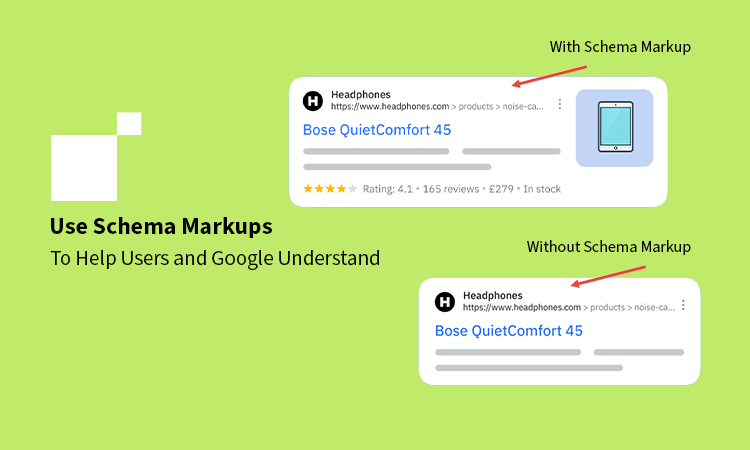
Adding Schema markups can help improve your SEO for ecommerce efforts. Using proper schema markups can help search engines produce rich snippets that show detailed information about specific queries at the top of the search results.
These are some of the most common types of schema that you can add to the ecommerce website:
- Product Schema: This schema allows the display of product-rich information like its availability, price, images, etc. through ads.
- Review Schema: It helps visitors find the reliability of your products through online reviews on your and other websites.
- Video Schema: Attract the audience in the best way by offering them a display of the product content in the form of video clips.
- Product Availability Schema: This schema includes the list of products available for purchase detailing their name, description, images, prices, etc.
- Price Schema: This schema technique compels the audience by showing them the price range or pricing of the products.
8. Conversion Rate Optimization
If you are in the eCommerce business, conversion rate optimization is a critical factor.
You can ask, does conversion rate optimization impact SEO?
Yes, it does! Not directly, but SEO and CRO are indirectly interlinked, they function symbiotically.
CRO is made primarily of 4 components. They are;
- Conversion research
- User experience (UX)
- Website persuasion
- A/B testing & personalization
Simplistically, conversion rate optimization means optimizing the number of customers that take direct action on your website (purchase). This process is directly focused on boosting sales.
A high conversion rate signals the search engines about the content/ product quality of a website, and hence, it boosts the search engine rankings.
9. Monitoring and Measuring Ecommerce SEO Success
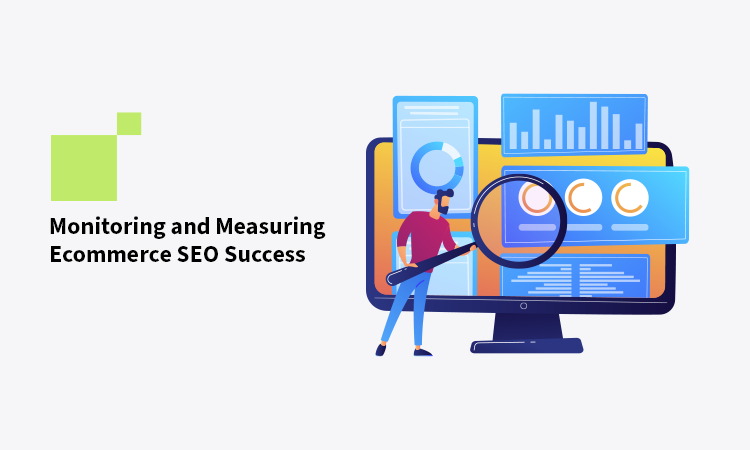
It is extremely vital to measure the SEO efforts from time to time!
You cannot just optimize your website’s SEO and let it dangle about in the air. Remember, SEO is not a one-time effort. You will have to keep a tab on it. Hence, tracking the key performance indicators can assist in analyzing website performance.
With tracking performance, you will get a crystal-clear idea of how the KPIs perform key performance indicators are;
- SERP ranking
- Click through the rate on your website.
- On-page time
- Bounce rate
- Website traffic source
- Conversion rate
- Funnel drop-off rate
10. Optimize Google Merchant Account for Better Online Visibility
The Google merchant account is a free tool that lets you enlist the products for better discoverability. It allows shoppers to discover and buy your products.
There are millions of shoppers who look for various products online on Google. For instance, if someone is looking for a waterproof laptop bag and types it on Google, then when they select the ”shopping category”, they will find a myriad of options.
If you optimize the Google Merchant Account well enough, your products will appear high on the Google shopping results, giving the website’s online visibility an edge. The product listings can also appear on Google search results, Google Maps, and more.
Wrapping Up
As we discussed earlier, SEO is an ongoing digital marketing strategy. It is perhaps the only way you can boost the footfall of organic traffic on your ecommerce website. If you are too tied up to do the job yourself, you can search for the best eCommerce SEO package. Not only will it save time and money, but it will also exponentially help in the growth of your business.
You can hardwire search engine optimization on your website all by yourself if you know the basis of eCommerce SEO. If you don’t have the knowledge or want to stay away from the hassle, you can bank on an SEO agency to get the job done for you.
So, stay committed and optimize your website to get the maximum potential!
Additional Resources
- The Beginner’s Guide to eCommerce Analytics
- Easy-to-follow Shopify SEO Guide to Grow Your eCommerce Sales
- A Beginner’s Guide to Amazon SEO to Boost Sales Quickly in 2023 (Updated)
- The Ultimate Guide to Walmart SEO: Strategies for Increased Visibility


